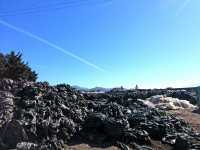A Place For Used Plastic Mulch

At the end of a crop’s season, growers are often stuck with finding ways to get rid of the large volume of plastic mulch used in their fields before transitioning to the next planting. A Salinas, CA-based manufacturer of reusable shopping and restaurant bags offers growers a solution.
Command Packaging will soon open a new 130,000-square foot facility in Salinas, CA, with the sole purpose of recycling plastic mulch. At the Salinas facility, plastic agriculture waste such as plastic mulch, fumigation film, irrigation drip tape, almond film plastic, HDPE plastic grape cover, and greenhouse film plastic are collected, washed, and recycled. Encore Recycling will turn the recycled plastic into reusable shopping bags, a move fueled by the push by communities to reduce the amount of plastic shopping bags.
“We will accept most forms of polyethylene plastic (at the Salinas facility),” said Pete Grande, CEO of Command Packaging and Encore Recycling. “We are primarily interested in fumigation film, mulch film, drip tape/tubing, hoop house film, and processor plastic film.”
The plant will open in October and is expected to process 20 million pounds. But in 2014, the plant will ramp up operations, add more staff members, and is expected to process more than 100 million pounds of plastic yearly.
“It offers us the unique opportunity to avoid sending approximately 135 tons of agricultural plastic to the landfill. … We anticipate that participating in the program will result in significant cost savings” said Thomas Flewell, spokesman of Dole Berry Company.
Casey Bassetti of Red Blossom Strawberries agrees with Flewell, saying “we’ve struggled to find a recycler large enough to handle the discarded farm plastic we use every year in the Salinas Valley.”
Drop-Off Locations
Encore Recycling offers local drop-off locations, including the Yolo County Central Landfill and estimates the cost-savings for a grower with 1,000 acres to be approximately $110,000.
“(We) recently recycled drip tape and some white onion film at the Yolo County Landfill. We recycled 3,800 pounds total. The majority recycled was drip tape,” said Patty Rominger of Rominger Brothers Farms in Winters, CA. “It was very easy to recycle the materials. We just loaded up a trailer four times and dropped off each load at the landfill. The staff at the landfill was very helpful.”
Growers, though, should prepare the plastic mulch prior to collection. Grande advises that “growers should try to eliminate as much contamination as possible when they collect the plastic. Rocks, metal, wood, and dirt all need to be removed before we can recycle the plastic.”
“We are excited to be a part of such a common sense yet impactful business solution to a problem that needed addressed,” said Paul Frost of Pacific Gold Farms.
Filling A Need
The move to add an agriculture plastic recycling facility in California was filling an existing need, Grande said. He noted the lack of recycling of plastic film and the void of a processing plant in the U.S., as driving forces behind the plant’s creation.
“We looked around the world to see what was being done and discovered that in Europe virtually all of the plastic used in agriculture was being recycled,” said Grande. “We further studied what they were doing and were surprised to learn no one in the U.S. was doing this. Since we are a California company and agriculture is such a big part of our economy we decided this was our chance to make a difference so we made the decision to invest in recycling of agricultural plastics.”
He also said the void of a agriculture plastics recycling facility was felt by the ag community. “(Growers) have wanted this for a long time. They have been disappointed in the past by companies that didn’t know how to recycle it or were exporting the plastic when there was high demand and would disappear when demand waned,” said Grande. “We are the first plastic company that has the technology and the on-going demand to be a key partner for years into the future.”
He also says growers will enjoy the benefit of having a place for their used plastics and the economic benefit of not paying for the disposal.
“(Growers) will also enjoy the convenience of local drop-off locations so they can remove and dispose of their plastic as soon as the fields are ready instead of waiting for a pick up,” said Grande. “They also will get the benefit of being good environmental stewards considering the growers are constantly under pressure for water, chemicals, labor, and other issues. This is one less issue they have to be concerned with.”
Grande sees the reasons growers should participate as being clear-cut. “If something can be recycled it should be. Agricultural plastics can be, so we are giving the growers the tools to do it. Second, farmers are protectors of the environment by nature because they count on healthy environments to produce their products — our food,” said Grande. “Recycling products used in the farming process is something they are willing to do if it makes sense.”
For drop-off locations and for more information, visit encore-recycling.com.










